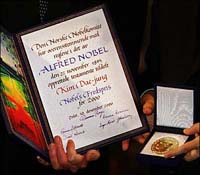Two Americans share Nobel Prize in medicine for work in controlling the flow of genetic information
Americans Andrew Z. Fire and Craig C. Mello won the Nobel Prize in physiology or medicine for their work in controlling the flow of genetic information.

The Karolinska Institutet in Stockholm honored the pair Monday for their discovery of "RNA interference gene silencing by double-stranded RNA."
RNA interference occurs in plants, animals, and humans. The institute said it is of great importance for the regulation of gene expression, participates in defense against viral infections, and keeps jumping genes under control.
RNA interference is already being widely used in basic science as a method to study the function of genes and it may lead to novel therapies in the future.
Fire, of the Massachusetts Institute of Technology, and Mello, of Harvard University, were born in 1959 and 1960, respectively.
"This year's Nobel Laureates have discovered a fundamental mechanism for controlling the flow of genetic information. Our genome operates by sending instructions for the manufacture of proteins from DNA in the nucleus of the cell to the protein synthesizing machinery in the cytoplasm. These instructions are conveyed by messenger RNA," the institute said.
Fire and Mello published their discovery of a mechanism that can degrade mRNA from a specific gene in 1998.
Last year's medicine prize went to Australians Barry J. Marshall and Robin Warren for discovering that bacteria, not stress, causes ulcers.
The physiology or medicine prize, presented by the Nobel committee at the Karolinska institute in Stockholm, kicked off two weeks of award announcements ending with the Nobel Peace Prize on Oct. 13. On Tuesday, the physics prize will be announced, followed by the chemistry prize on Wednesday. The economics prize will be announced Oct. 9. No date for the literature prize has been site, but it is likely to be announced on Thursday or on Oct. 12.
The Nobel committees do not reveal who has been nominated for the awards, but that does not stop experts and Nobel-watchers from speculating on potential winners.
Afred Nobel, the Swedish inventor of dynamite, established the prizes in his will in the categories of literature, peace, medicine, physics and chemistry. The economics prize is technically not a Nobel but a 1968 creation of Sweden's central bank, reports AP.
Winners receive a check of 10 million kronor (Ђ1.1 million; US$1.4 million), handshakes with Scandinavian royalty, and a banquet on Dec. 10 the anniversary of Nobel's death in 1896. All prizes are handed out in Stockholm except for the peace prize, which is presented in Oslo.
Subscribe to Pravda.Ru Telegram channel, Facebook, RSS!




